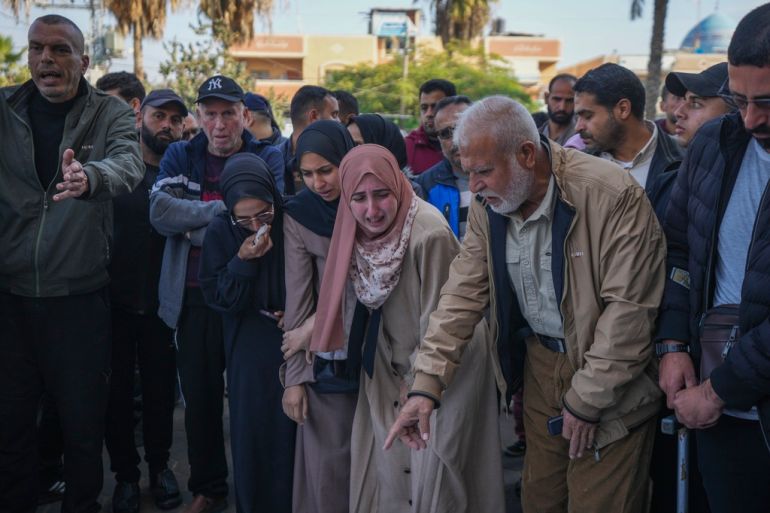Palestinians decry ‘barbaric’ Israel strike on Gaza’s Nuseirat refugee camp
Several members of same family were killed in an Israeli strike on a shelter for displaced Palestinians in central Gaza.
Palestinians mourn the victims of an Israeli strike on the Nuseirat refugee camp in Deir el-Balah, in Gaza, on December 12 [Abdel Kareem Hana/AP Photo]Published On 13 Dec 202413 Dec 2024
Palestinian authorities have said that at least 33 people were killed in an Israeli strike on the Nuseirat refugee camp in central Gaza, as Israel continues to conduct devastating attacks across the strip.
The Government Media Office in Gaza called the Thursday attack a “barbaric and heinous massacre”, noting that most of those killed hailed from the al-Sheikh Ali family.
“The [Israeli] occupation army knew that this is a residential block with many apartment buildings housing dozens of civilians, children, women and displaced people,” the office said.
Medics told the news agency Reuters that Israeli fire struck a postal office in Nuseirat sheltering displaced Palestinian families, as well as nearby houses.
Photographs from the scene show young children coated with dust and blood in the rubble of a collapsed building. Reuters reported that about 50 people were wounded in the deadly strike, in addition to the 30 or more dead.
In Gaza, it is not uncommon for aerial attacks to kill numerous members of the same family, as Israel’s war continues into a second year.
Advertisement
As of October 2024, the one-year anniversary of the war, Israeli strikes had completely wiped out at least 902 entire families in the Strip, according to the Government Media Office in Gaza.
Throughout the war, facilities and buildings sheltering displaced families have been attacked by Israeli forces, who often claim, with little evidence, that they are being used as operation centres for the Palestinian armed group Hamas. Israeli authorities have yet to comment on Thursday’s strike in Nuseirat.
Health facilities, journalists, and humanitarian workers have also reported being persistently targeted by Israeli forces since the fighting began in October 2023, when Hamas launched a deadly attack on southern Israel that killed about 1,100 people, most of them civilians.
In the time since, Israeli attacks have killed more than 44,800 Palestinians in Gaza, more than half of them women and children.
On Thursday, the watchdog group Airwars, which assesses civilian harm from air strikes, released a report stating that Israel’s campaign in Gaza was “by far the most intense, destructive, and fatal conflict for civilians” that it had ever recorded.
The report found that, during the first month of the war, the number of civilians killed by Israeli strikes in Gaza was nearly four times greater than the death toll of “any conflict Airwars has documented since it was established in 2014”, over a comparable time period.
Experts and rights groups also say that the Gaza death toll is likely a vast undercount, with thousands more buried beneath mountains of rubble and the strip’s health services struggling to maintain operations.
Advertisement
Thursday’s attack on Nuseirat struck a largely residential area in one of Gaza’s eight historic refugee camps, established in 1948 after the forced expulsion of Palestinians from nearby areas, often called the Nakba or “catastrophe”.
It was one of several strikes in Gaza throughout the day. In another refugee camp, Jabalia, Israeli forces fired upon Saeed Jouda, a top doctor who worked at the Kamal Adwan Hospital, as he made his way to treat patients. He died as a result.
An estimated 1,057 healthcare workers have been killed since the start of the war. The Government Media Office in Gaza also highlighted the strains on the enclave’s medical system in Thursday’s remarks.
“This latest crime coincides with the Israeli occupation’s plan to topple the health system in the Gaza Strip, exerting massive pressure on medical teams,” the media office said.
“It is coupled with continued attacks on hospitals and medical centers, putting them out of service. Moreover, the occupation prevents the entry of medicines and medical supplies and equipment as part of the crime of genocide.”
